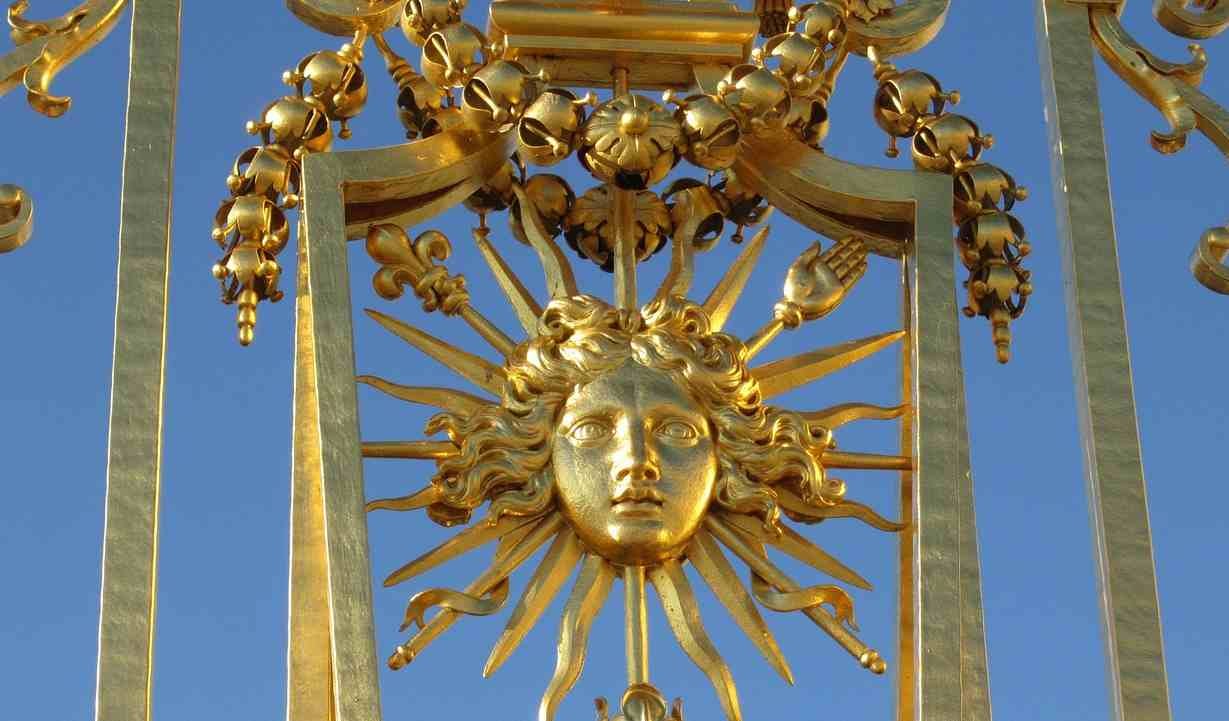In his reflection on The Courtly Society, Norbert Elias drew the picture of the courtier who, socially and economically uprooted, found a kind of substitute destiny in the courtly life of Versailles. If you remember those grotesque contortions that courtly etiquette predisposed the courtiers to perform, the question is relieved-out as the real meaning of these ceremonies. As a particularly absurd example, Elias cites the dressing protocol of the monarchs. Thus, there was a strict hierarchy among the court ladies as to which lady-in-waiting was authorized to present a particular garment to the queen:
On one occasion the queen had just been completely undressed by her ladies. Her chambermaid was holding the chemise and had just presented it to the maid of honour when the Duchess of Orleans came in. The maid of honour gave it back to the chambermaid who was about to pass it to the duchess when the higher-ranking Countess of Provence entered. The chemise now made its way back to the chambermaid, and the queen finally received it from the hands of the countess. She had had to stand the whole time in a state of nature, watching the ladies complimenting each other with her chemise.1
Now, as Elias notes, this label represents a phantasmic perpetuum mobile, which continued to exist running independent of any immediate use value, because it was driven on and on, as if by an inexhaustible motor, by the competition for status and power opportunities of the people entangled in its relationship [...]. If Pierre Bourdieu, following Elias, understood the dispute over prestige and status as a form of symbolic capital2, it’s evident we are faced here with a money system that has been transferred into the symbolic — to which Hugo von Hofmannsthal still refers in his recollection of bourgeois manners:
Those who observe manners in their dealings with people live off their interest; those who disregard them attack their capital.
Without a doubt: the engine of courtly society is etiquette, which controls every movement, every look, and every gesture. If you follow it, you can bathe in the exhilaration of exclusivity — while the world that opens up beyond the boundaries of the park (of etiquette, of better society) is dismissed as a desert.3 Now, it would be easy to summarily dismiss courtly etiquette in its historical distance as a form of decadence — overlooking that exclusion from this coercive system meant social death. In this sense, the Courtier is encased in a constraining corset no less severe than the alienation we blame on capitalism.
Its compulsions are oppressive; but even if the cage were open it would be impossible to escape; for the ties holding the courtier prisoner in the great world are a part of himself. He could return to the home of his ancestors, but would not be able to there what he sought. The free country existence of his childhood has become a dream, like his childhood itself.4




We could read this quotation as a signature of what is nowadays called a 'bubble': being interconnected and interwoven within a specific context of communication, an economy of favor, in which the mutual give and take plays just as significant a role as the sharp demarcation against an outside world that’s been dismissed as uncivilized and barbaric. The great merit of Elias's socio-analysis is how he thinks of the hour of the Courtier together with his economic disempowerment. The aristocracy that settled at the Versailles court sooner or later lost its power as well as its economic basis — and so the symbolic currency of etiquette and prestige offered itself as surrogate compensation for the actual loss of power and importance.5
The parallels are striking if you consider the current attention economy under these auspices. Since many of the most recent sensitivities can be understood as a form of postmodern etiquette, it is no coincidence that terms such as mindfulness, sensitivity, and the like are booming. And because such idiosyncrasies have also taken hold of the classe politique, this bubble could be seen as a new form of courtesanship — a world that, having become depotent and functionless, is more concerned with following its rules of attentiveness than with solving real problems. With this in mind, you can understand the moralization of politics and why sensibilities, marginal issues, and idiosyncrasies have been hyped up into political issues of the first order while doing everything possible to avoid the travails of the plains — as if the real world were as distant from the dwellers of the cloud, no, from the Woken Cuckoo's Home, as the wasteland that opens up just beyond the French park.
Moral indignation is a technique used to endow the idiot with dignity. (Marshall McLuhan)
The rulers' loss of reality can be marveled at every day. The fact that the classe politique has been able to gloss over the erosion of the education system, the problems of migration, and even the self-imposed energy turnaround for decades testify to the fact that short-term governance has led to short-sightedness, even to a form of collective delusion. And in turn, this has led to symbols taking the place of situational realities (as evidenced in the various Excellence initiatives, which haven’t prevented the 'Educated Republic of Germany' from sliding into a severe educational crisis). Now, such a symbolic policy isn’t just proof of a progressive loss of reality, but it goes hand in hand with the fabrication of a political etiquette functioning like the phantasmic perpetuum mobile of courtly society. If political economy’s relevance has become insignificant while idiosyncrasies and identity issues dominate the political debate, then this is precisely an indicator we’re now dealing with only symbolic capital. Indeed, the much-used term symbol politics obscures its true meaning here. Because it is primarily by these symbols that the actors recognize each other — and over which they fight their turf wars. In this sense, the gender star6 promises a distinctive gain, just as the identification of this or that *phobia identifies the speaker as being mindful of class member identity, inclusivity, diversity, and the like, that’s made being Awoken a particular educational requirement of political discourse. The linking of the postmodern type of politician with courtesanship may seem irritating. Structurally, however, the discourse of political correctness reveals an astonishing kinship. Like the Courtier, made up and powdered, wrapped in silk and swaths of perfume, contemporary courtiers wrap themselves in a pomp of pseudo-philosophical verbiage that, visualized, would make a similarly grotesque sight as the oversized allonge wigs that the courtiers put on. If we follow the etymology of the word etiquette, we quickly arrive at the sticker — and from here (via the French estechier) at the badge, the sewn-on or pinned-on sign of recognition. If Atomkraft, nein danke! (Nuclear Power, No Thanks!) was the post-68 generation's sign of recognition; the other basic conviction was a fundamental doubt about the system. In this sense, the badge was something like generational glue: you could use it to claim the identity of a neg-identity for yourself while indulging in the conviction of being utterly different from your predecessors (which is why crossing out your prehistory doesn’t mean a loss, but a liberation). The following Jewish joke wonderfully illustrates how such a negation can become socially binding.
Yom Kippur in the synagogue. The cantor sends a personal prayer to heaven: "Dear God, Lord of heaven and earth, I am nothing, a nothing!" Hearing this, the rabbi also follows up with a similar prayer, "O Lord, I am nothing, even less than nothing." Now the Shammes, the synagogue servant, also makes himself heard, and he cries out loudly, "I, too, am a nothing, O Lord, a nothing!" The rabbi, with a sniff, says to the cantor, "Look who thinks he's nothing these days."
Now, this change doesn’t only concern the excesses of Victim Olympic Championships but that it’s advancing to the status of good manners. Therefore, those who derive their beliefs from discourses on the possibility of decolonization and critical justice can gain recognition from the ostentatiousness of self-flagellation. In this sense, pride in sin, and even the negative identity pulsating within it, represent the highest form of identity politics.
If you follow the standards of contemporary etiquette, you have immediately gained a double. On the one hand, you have successfully dropped out of the narrative, and on the other hand, you may enjoy, no, not the favor of the Sun King, but, like the Courtier, the Sun's energy — which is a form of higher wisdom. You also get the impression that denying unpleasant facts, and of the political economy in general, is the entréebillet with which the aspirant can enter the political sphere. In any case, you can begin to understand how the climate issue (in its apocalyptic variety) has ascended as the dominant ideology. This is because political supremacy can be claimed regarding the imminent catastrophe. And because it isn’t by chance we refer to Schmitt's decisionism here as a delving into the register of political theology. It’s therefore perfectly understandable that the director of the Climate Emergency Fund, Margaret Klein Salomon, welcomes the state of emergency as a form of psychological flow - thus conjuring up that collective state which, up until now, had only been reserved for artistic genius as unleashed imagination. In this sense, the state of emergency represents a moment of ecstasy, a mind-expanding drug with which we can brilliantly disguise our powerlessness and cluelessness. If you think of these two things together (the necessity of group amalgamation, through which free radicals network with others; then the political label — as a mark of exclusivity, with which you flank yourself against the rabble), you can clearly understand how the attention economy has captured the political arena here. Because gaining personal distinction is based on giving the appearance of having the highest virtuosity and integrity, moral competition is started where the competitors outbid each other with categorical symbolic superlatives. Even if these reach levels of the absurd, this behavior follows the intrinsic logic of symbolic capitalism. In this sense, Norbert Elias's remark on the importance of etiquette is highly pertinent.
Court etiquette which, by the values of bourgeois-industrial societies, may well seem something quite unimportant, something merely external and perhaps even ridiculous, proves, if one respects the autonomy of the structure of court society, and extremely sensitive and reliable instrument for measuring the prestige value of an individual within the social network.7
What networking means, and what used to be called vitamin B or a rope team, is simply the willingness to submit to an etiquette that promises distinction, privilege, and a sinecure. This is why, when courtiers write with fervor against hate and agitation, they do so on their Twitter and Instagram accounts. And if the realities of the situation don't match their fine words — so much the worse for the facts!
Now it is easy to be amused by the aberrations of the contemporary classe politique, but it becomes much more complicated when you want to clarify the reasons and answer questions of how such a perpetuum mobile has been able to conquer these heads. The beginnings of this development go back a long way — and it has to do with the increasing insignificance of nation-state entities. Just as the feudal systems of the Middle Ages were once transformed into entities with holes in them8, the nation-states were increasingly worn down and pierced by the world's financial markets and then by globalization and digitalization. While the policies of the 1990s and 2000s were still aimed at securing certain advantages in the competition between national economies, after the financial crisis, it was only a matter of maintaining the status quo, or more precisely, appearances. Whereas the great grumbler Thomas Bernhard could still causticize about his fatherland ("This country is not worth the paper its brochures are printed on"), the classe politique has agreed to maintain its illusion of sovereignty using the press. In this sense, we could speak of paradoxical etatism, a belief in the state in which you try to keep alive that which, after all, you have incessantly criticized. The reason is simple: just as the court of the Sun King promised its courtesans entertainment and privileges, the office of state represents a highly lucrative sinecure. As a result, aspirants try to secure a place in the state’s apron organizations or parliament. However, the goal isn’t to shape economic events or the political arena but securing a lucrative sinecure — or, as Max Weber noted: You no longer live for politics but from politics. Consequently, abandoning the reality principle doesn’t pose a significant problem. Au contraire, once you’ve left the political economy behind, you can, so to speak, abandon yourself to pure form; it’s only a matter of accumulating the appropriate attention capital. When appearances are everything, it isn’t any wonder that real existing personalities are mainly characterized by self-indulgence; that skillsets of telegenuity and talk-show repartee are prerequisites essentials for a successful political career. The dark side of this logic is it attracts narcissistic personalities — to which the list of false doctorates, pretenders, and plagiarists bears eloquent witness. Much more remarkable than individual character or educational deficits, however, is that etiquette takes on a certain momentum of its own — plainly, it becomes the operating system of the apparatus itself as its phantasmic perpetuum mobile. Just as real capitalism is in constant danger of losing itself in all kinds of financial catastrophes, political etiquette also tends to form bubbles. Indeed, here it is primarily the moral gambler who risks profiting from them in hazardous excess (which explains why questions that used to arise at the extremes of the political spectrum have now moved to the center). And while you’d first welcome this below purchase price as a form of liberation, it’s becoming increasingly apparent that etiquette also has its price, which is higher and more ruthless. Because every morally charged argument is ad hominem aiming below the belt, the step to moral panic and cultural war isn’t far away; there is even the fear that the Revolution devours its children. In any case, the effect of this symbolic capital is that the political space itself is becoming increasingly precarious — indeed, the danger of being sidelined by a slipped remark or a failed tweet is omnipresent. And just as the climate apocalypse amounts to a final judgment without forgiveness or mercy, the etiquette of Wokistan demands the expulsion of the delinquent - in real-time (which amounts to the return of the summary court-martial). Accordingly, the constraints of the political actor are only marginally different from those of the Courtier: for "even if the cage were open, one could not escape it"; the bonds that imprison in the larger world have long since become an integral part of the self.
Translation: Hopkins Stanley and Martin Burckhardt
Norbert Elias, The Court Society [Die höfische Gesellschaft], New York, 1983, p. 86 Translated by Edmund Jephcott.
Pierre Bourdieu, Distinction: A Social Critique of the Judgement of Taste, Cambridge, Massachusetts, 1984. Translated by Richard Nice.
Martin has written an in-depth analysis of the French Park and its formal social en-structuration during the reign of Louis XIV, the Sun King. See Martin Burckhardt, Gesellschaft im Park, in Metamorphosen von Raum und Zeit. Frankfurt/M. 1994. [Translator’s note]
Ibid, p. 229
Even if Louis XIV was idolized by his courtiers in an almost grotesque way, the courtly bustle was a veil obscuring the view of the fundamental change in the political economy. Because of the disempowerment of the nobility, the capitalist money economy and the bourgeoisie were steadily gaining importance. The powerful finance minister Colbert, who stamped his name on the era's mercantilism, was a commoner himself.
The Genderstern [Gender Star] and its diminutive Gendersternchen [Gender Asterisk] gender star is a non-standard speech style that’s become a linguistic bad habit commonplace among Germany’s Wolkenkuckuck [Woken Cuckoo] elite as a bid for non-gendered speech in German gendered-language. Exemplary, in their attempt at gender umbrellaed inclusion (including the non-binary), these elitists no longer speak of the Studenten [students], but of a Student*innen. Another exemplar would be Mörder [male murderer, singular and plural], becomes Mörder*innen[murderers]. In speech, the Genderstern is vocalized by a small glottal stop or pause – which gives the appearance of hiccoughing; and its use is controversial. [Translator’s note]
See ibid, p. 8.
The mechanism is simple: With the emergence of the money economy, the prospering cities bought themselves out of their feudal obligations - with the result that the feudal structures, like Swiss cheese, soon consisted of more holes than substance.






